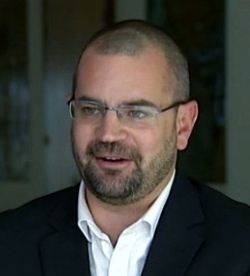 A
Charles Sturt University (CSU) terrorism expert says the use of social media by
Islamic State in Syria and Iraq (ISIS) can only be managed and mitigated from
this point on.
A
Charles Sturt University (CSU) terrorism expert says the use of social media by
Islamic State in Syria and Iraq (ISIS) can only be managed and mitigated from
this point on.
In a recent commentary blog on The Strategist, Mr Levi West, lecturer in terrorism studies at the CSU Australian Graduate School of Policing and Security (AGSPS) in Canberra, said understanding how Twitter is exploited by supporters of ISIS, known as 'Daesh', is crucial to developing effective counter strategies.
"How do you defeat an organisation that Tweets 100 000 times a day with relative impunity, has an audience interested in its output, and is capable of shifting to various other platforms with ease?" Mr West asks.
He argues that the forces countering ISIS have 'lost' the online battle simply because they can't 'win' it, so 'winning' needs to be redefined in this context to 'managing and mitigating'.
"Daesh's global aspirations, and the maintenance of its global presence, are based on the power of social media to maintain and reinforce narratives of meaning and to act as a command and control system for a decentralised and distributed network of global actors," Mr West said.
"Daesh intentionally seeks control of, and actively shapes, the social media coverage of itself and empowers its supporters to participate via Twitter. One of the primary purposes for which Daesh uses social media is to reinforce and refine the narrative associated with its activities, particularly its violent activities. Monitoring and disrupting this social media network, and contesting the Daesh narrative, is crucial to limiting the power of Twitter when it is used maliciously."
Mr West said the ease of access, scale of output, and options for interaction by virtual jihadists make Twitter an incredibly powerful tool for the political and ideological communication essential to any terrorist or extremist organisation.
"Twitter enables the establishment of a direct line between the tweets of individuals involved with Daesh and the newspapers and the television screens viewed by the public," he said.
"Twitter is also increasingly powerful as a command and control system for the leaderless model that Daesh relies upon for its global operations. Various jihadist groups in the Syria-Iraq conflict zone, particularly Daesh, use social media aggressively, especially Twitter, to recruit fighters and disseminate propaganda about their activities. Daesh successfully exploits Twitter in both a strategic and tactical manner. Understanding why Daesh deploys and leverages Twitter is central to the development of effective intervention and disruption strategies."
Mr West said the role of trust in social networks also informs much of the Daesh's effectiveness in social media, and Tweets from the battlefield matter because they provide authenticity.
"Advertising and marketing research, as well as computer science research, have demonstrated the benefits of peer-to-peer communication, and the authority and trust that is placed in information received through trusted peer relationships," he said.
"In a terrorism or extremism context, social media enables this network of relationships to expand globally, and to no longer require either geographic, organisational or relational proximity to exist. It also greatly reduces opportunities for exposure to authorities.
"For these reasons it is crucial that we develop effective counter strategies and other public policy levers because the online environment continues to play a central role in the lives of young people in particular, and the inherent vulnerabilities associated with it provide ubiquitous opportunities for malicious influence by these groups," Mr West said.





Social
Explore the world of social